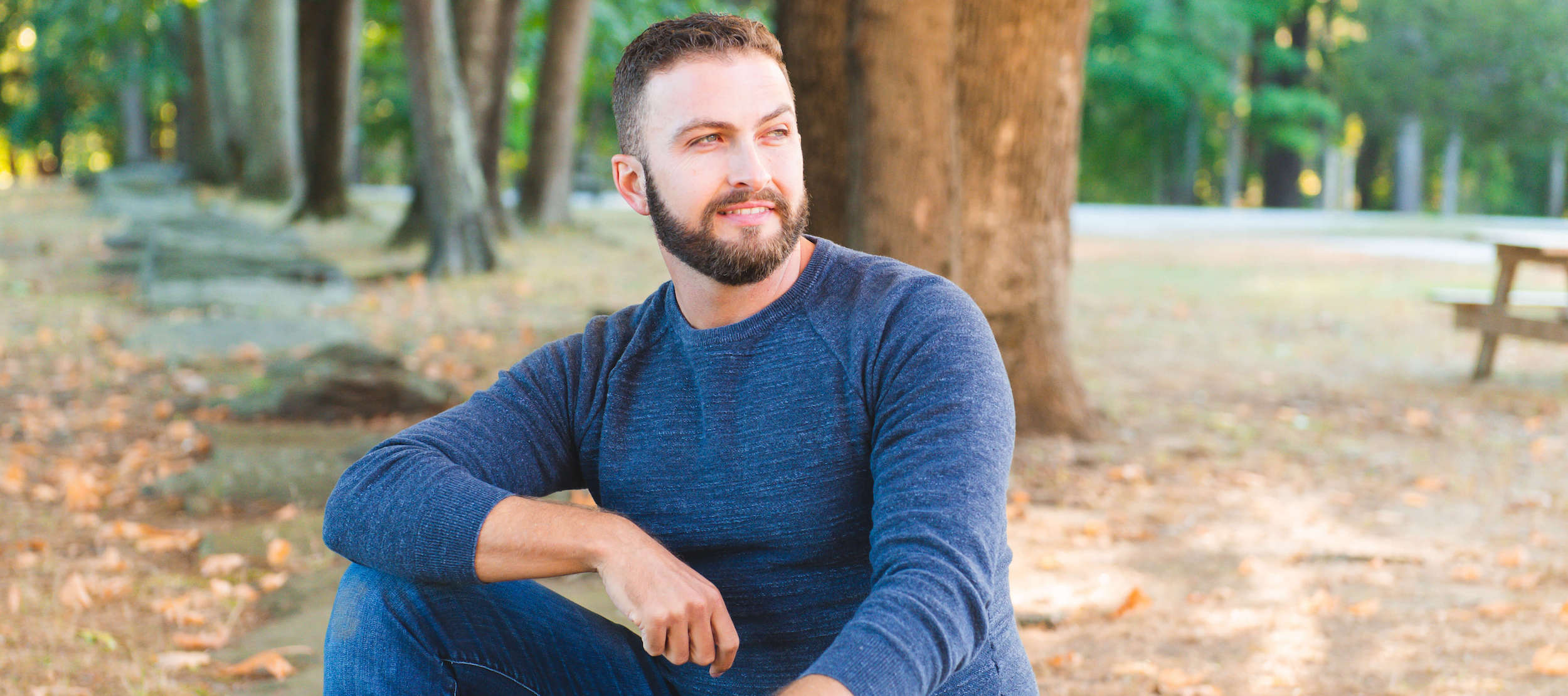My holiday season for the year 2020 is already over.
But it’s not for reasons that you might rightly assume, given what this year has been for so many of us:
It’s not that the celebrations have already been called off by a governing body due to continuing pandemic concerns.
It’s not because my family and I have already decided that we won’t be congregating together over the next couple of months.
It’s also not because we’ve lost all hope — or have forgotten the essence of what it means to celebrate anything at all. Even though, at this rate, that wouldn’t be totally unreasonable…
The reason why my holiday season is already over is because my family and I have already celebrated all of them.
How We Celebrated Our Holidays in 2020
Our fifth and final holiday celebration concluded last week on October 13th.
But how did the holiday season for the Ursillo family already come to pass, to begin with? Well, first, certain events unfolded this year — like a virus that shall not be named, I believe you know the one to which I am referring? — that affected the ability of our family to get together for any celebrations, at all.
As has been the case for so many the world over, the pandemic disrupted the natural flow of how my family members have been able to come together and spend time with one another this year.
(I’m sure you can say the same!)
But specifically, it’s been my sister, Bianca, who lives in Los Angeles, who was left most isolated from the rest of our family who live in and around Southern New England.
Bonky, as we tend to call her, usually comes back to Rhode Island for visits every summer and then every winter for the holidays.
This year, of course, she wasn’t able to fly home over the summer months. As we’ve known for some time that a continued spike in national infection rates could jeopardize travel in December, we began to worry that she wouldn’t be able to join us again during our usual winter holiday season.
So when an opportunity arose in October for my sister to visit the family, we had a weird idea.
Our parents, she and I were all on FaceTime together when I half-jokingly suggested,
“So, if you may not be able to come back to Rhode Island for the holidays, what if we celebrated Christmas in October?”
Then, one thing led to another:
- Bianca insisted that we go apple picking for a truly autumnal New England experience, and I suggested we bake an apple galette — one of my go-to favorites for home baking
- Our mom, Jane, insisted on a Halloween party — consisting of dressing up in costumes, eating candy, and, for some reason, doing Jell-O shots
- Our dad, David, really wanted to celebrate Christmas Eve with his favorite traditional meal, the “Vigilia” or “vigil,” an Italian-American tradition consisting of a dinner of seven fishes
And on it went…
We found ourselves saying things like, “Who’s to say we can’t get our Jingle Bells on before October 31st?”, and, “…or bake a turkey and wear heavy sweaters when it’s still 75 degrees outside?”, and, “…or pretend the New Year’s Eve ball is dropping when it’s really 7:30 PM on a Tuesday?”
(This is 2020, after all, friend. Rules and conventions really need not apply, am I right?)
By the end of it all, our family had committed to getting fully weird and celebrating no fewer than five holidays over six days this past October.
And we have the photos to prove it:
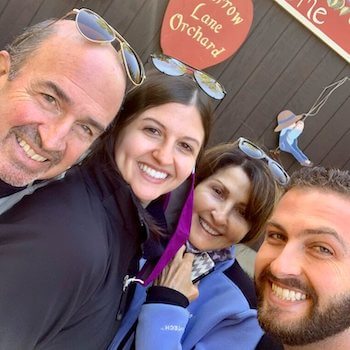

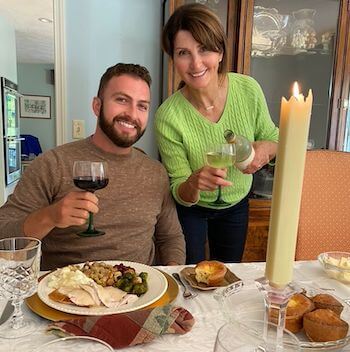

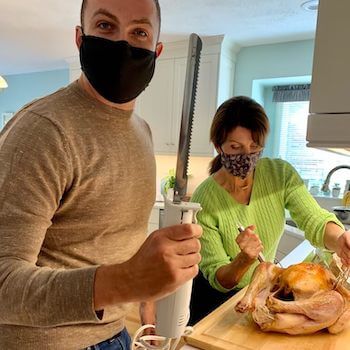
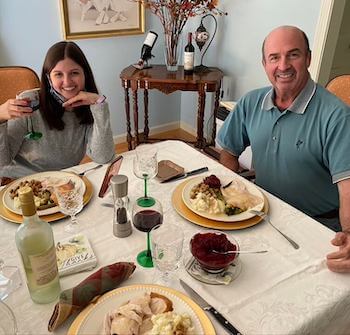

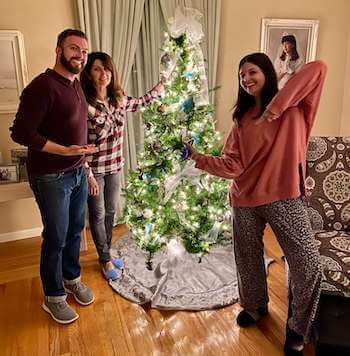
The story of why my family celebrated all of the remaining major holidays in 2020 this past October — either weeks or months in advance of their usual days of celebration — is because we wanted to be able to celebrate them together.
Holidays aren’t only occasions meant to mark certain ideas, myths, or traditions of old, they are socially agreed-upon excuses for us to find collective pause, gather and reflect, and celebrate life with one another.
It only made sense for us to celebrate while my sister was in town when we knew that we’d be able to mark the occasions as a family.
But, on the other hand, friend?
I believe there is another, more subtle reason why my family felt collectively motivated to marathon-eat our way through five holiday-themed meals over six days.
To me, part of our reclamation of the holiday season — while we had a chance to make the most of them when we could — reminded us, even unconsciously, that we still possess the power to tell our own stories.
Even in 2020.
This has been a year of many collective and individual hardships, stressors, and losses.
So many have been robbed of so much — most important among them, the loss of health, wellness, livelihoods, or simple peace of mind. Each of us has also, to a less dramatic but equally important extent, have also experienced losses that are worthy and deserving of not just recognition but mourning, too.
We have lost choice. We have lost usual freedoms. We have lost many familiar feelings of autonomy and self-determination.
One of the greatest losses that we have collectively experienced in 2020 has been the loss of the feeling like our stories are our own to tell.
Why Our Stories Matter
As human beings, we are the authors of the stories of our lives.
Even if we’re not always thinking about it consciously, we can all understand that, at a fundamental and essential level of human existence, it’s our outlook, choices, and personal perspectives that create the narrative fabric that we call “real life” for each of us.
In so few words: What we see as life, becomes life, for each of us.
But in the year 2020, so much of what we “see” has been constricted, disrupted, or taken away.
The choices, freedoms, senses of autonomy, ability to move or gather freely, and so much more have had to find necessary restriction so that systems would not collapse and even more peoples’ lives would not be lost too soon.
And with all the challenges the lockdown has posed, the one subtle feeling that I sense is still stirring angst and disillusionment in many is feeling like “the story” of this chapter of our lives has already been told for us.
And that we do not have a choice to live it out any differently.
That feeling is not an easy one to reconcile with some of our most influential and essential social values — especially in America, or a democracy, or a capitalist society.
So much of our shared culture, our collective myths, our foundational beliefs, and our consumer behaviors and expectations all revolve around the key concept of choice, freedom, and uninhibited personal authority.
Such is the case that any amount of perceived or real disruption to these expectations creates immediate dissonance.
Then, resentment.
Then, retaliation.
But just because we have been constricted, challenged, or less able to choose as freely does not, I believe, mean the stories of this chapter of our lives has already been “told” for us.
Adjusting to a new reality does not mean that we have any less fundamental freedom of choice, or self-determination, or personal authority.
That’s because “freedom” is not defined by the right to wear or not wear a mask.
“Self-determination” is not contingent upon the number of feet between you and another shopper at the grocery store.
“Personal authority” is not dependent upon whether we’re supposed to have a 5-, 10-, or 15-person limits at family gatherings this actual holiday season.
Freedom, self-determination, and personal authority are far more nuanced — and far more resilient — than even the most stringent or lax, logical or frustrating, scientifically-backed, or full-of-piss-and-vinegar responses to the pandemic.
At their core, the feelings and values that most greatly influence our experience of life are self-directed: originating inside, and directed outwards. Not the other way around.
Even in 2020, we still remain the true authors of our lives.
Even if certain freedoms or expectations have been temporarily changed, we possess an equal amount of freedom of choice — and an equally powerful capacity to choose our stories freely for ourselves.
And, while it can seem like the story of 2020 has already been, or is actively being, written “for” us, we nevertheless remain in positions of authority as souls:
We get to tell our tales for ourselves.
We are the authors of the stories of our lives, our year, and this chapter of each — even while trying to do the right thing, as best we can, for ourselves and for others.
We each remain the “master of our fate; the captain of our soul,” even while navigating the emotional highs and lows of uncertainty and unpredictability governing the meta-narratives of our time.
For me and my family, we decided to author a different sort of story than the one we that we foresaw coming — a story that, deep down, we did not want to feel was going to be “told for us.” And as a slight, added bonus?
In our minds, we’re already in 2021.
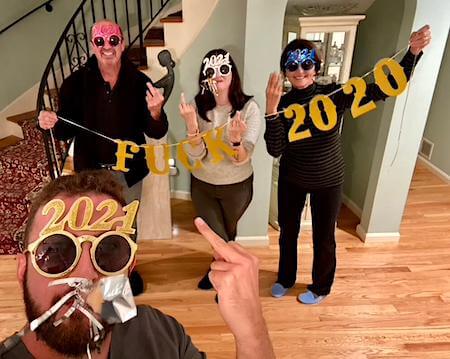
The future is bright, friend, even amid the darkness.
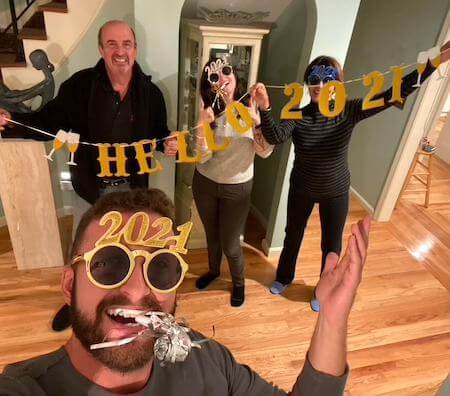
Keep authoring your story for yourself; please do not quietly allow anyone to tell yours for you.
Yours in 2021 — and in what remains of 2020,

